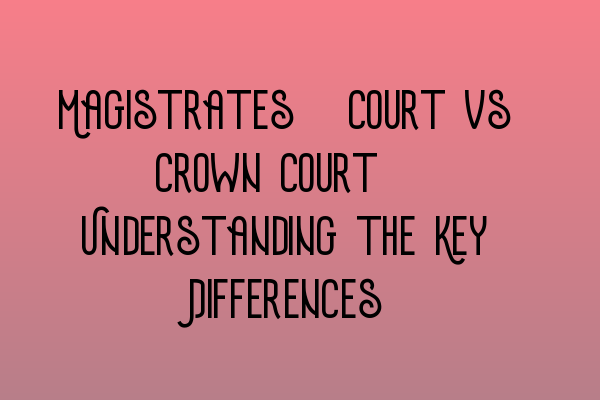Magistrates’ Court vs Crown Court: Understanding the Key Differences
Welcome to our comprehensive guide on the key differences between Magistrates’ Court and Crown Court proceedings in the UK. As a law practitioner or an aspiring criminal lawyer, it is crucial to understand the nuances of each court and the implications they have on your case.
Introduction
Magistrates’ Court and Crown Court are two key components of the criminal justice system in the United Kingdom. They play a vital role in delivering justice and resolving criminal cases, albeit at different levels of severity and complexity.
What is Magistrates’ Court?
Magistrates’ Court is the lower-tier court in the UK legal system, dealing with the majority of criminal cases. These cases include summary offenses, also known as minor or less severe offenses. Examples of summary offenses include petty theft, public order offenses, and minor traffic violations.
Magistrates’ Courts are presided over by a bench of typically three magistrates, also referred to as justices of the peace. However, in some cases, a single district judge may preside over the proceedings. These magistrates or district judges are not necessarily legally qualified, but they receive extensive training to understand the legal framework within which they operate.
What is Crown Court?
The Crown Court, on the other hand, is a higher-tier court that deals with more serious criminal cases. These cases include indictable offenses, which are more severe and complex in nature. Examples of indictable offenses include murder, rape, drug trafficking, and serious fraud.
Unlike Magistrates’ Court, Crown Court proceedings are presided over by a circuit judge or a high court judge. These judges are always legally qualified and possess the necessary expertise to handle complex legal matters. In Crown Court trials, a jury of 12 individuals plays a crucial role in determining the guilt or innocence of the accused.
Key Differences
Now that we have a general understanding of both Magistrates’ Court and Crown Court, let’s delve into the key differences that set them apart:
1. Jurisdiction
The most significant difference between Magistrates’ Court and Crown Court is their jurisdiction. Magistrates’ Court primarily deals with summary offenses and triable either-way offenses, which can be heard in either Magistrates’ Court or Crown Court based on their severity and complexity.
Crown Court, on the other hand, handles more serious cases that fall under the category of indictable offenses. These cases can only be tried in Crown Court and carry higher maximum penalties upon conviction.
2. Procedure
The procedural aspects of Magistrates’ Court and Crown Court proceedings also differ. Magistrates’ Court follows a relatively informal and streamlined process, where cases are typically heard summarily, without a jury. The sentencing powers of Magistrates’ Court are limited, with the maximum custodial sentence usually capped at 6 months or 12 months for multiple offenses.
Crown Court proceedings, on the other hand, are more formal and structured. Trials are conducted in front of a judge and a 12-member jury. The sentencing powers of Crown Court are more extensive, allowing for longer custodial sentences and greater flexibility.
3. Legal Representation
In Magistrates’ Court, defendants have the option to either represent themselves or seek legal representation from a solicitor or a barrister. However, legal aid is not automatically granted for all cases, and individuals may need to qualify based on their financial circumstances.
In Crown Court, legal representation is almost always required, given the complexity of the cases. Defendants have the option to choose their legal representative, be it a solicitor or a barrister. Legal aid is more commonly granted for Crown Court cases, ensuring access to quality legal defense.
4. Sentencing Powers
As mentioned earlier, the sentencing powers of Magistrates’ Court are limited. However, Crown Court has wider-ranging sentencing powers, allowing for longer custodial sentences, community orders, fines, and other forms of punishment.
5. Right to Appeal
Both Magistrates’ Court and Crown Court decisions can be appealed, but the appeal process varies between the two courts. Appeals from Magistrates’ Court typically go to the Crown Court, and then further to the Court of Appeal. Appeals from Crown Court usually go directly to the Court of Appeal or, in some cases, directly to the Supreme Court.
Conclusion
In summary, Magistrates’ Court and Crown Court play distinct roles in the UK legal system, each handling different types of criminal cases. Understanding the key differences between these courts is crucial for criminal law practitioners and individuals involved in the justice system.
Whether you are dealing with a summary offense in Magistrates’ Court or facing serious charges that require trial in Crown Court, it is essential to seek legal advice and representation from qualified professionals. Navigating the complexities of the legal process is always best done with expert guidance.
At SQE Criminal Law & Practice Law UK, we provide comprehensive legal services across both Magistrates’ Court and Crown Court proceedings. Our experienced solicitors and barristers can guide you through every step of your case, ensuring the best possible outcome.
If you require legal assistance or have any queries regarding Magistrates’ Court or Crown Court processes, feel free to get in touch with us. We are here to assist you.
